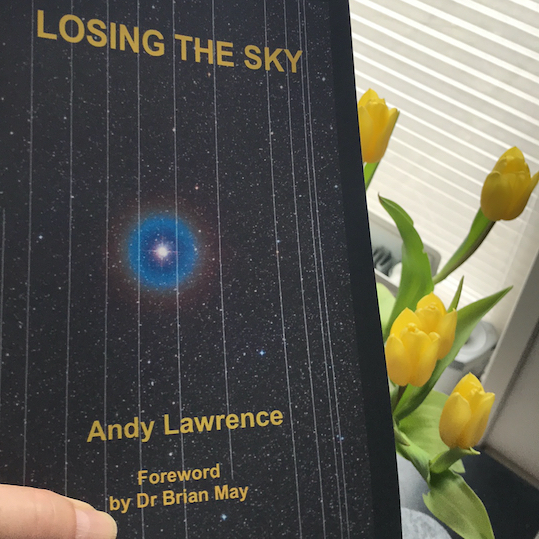The night skies have become barely accessible due to increasing light pollution. Satellite mega-constellations may eradicate it forever.
Each year in April, the week of the new moon is celebrated as the International Dark Sky Week. So let’s talk about our access to dark, starry skies. While our region is generally considered as one of the darkest in the country, the Dutch towns are notorious for excessive light pollution. We are facing it evermore, now that we started with our astrophoto hobby. Growing up in a small town, I have been always amazed by the view of the night skies. That is why I became an astronomer. Moving to larger cities, and eventually to the Netherlands meant that I lost the day-to-day connection to the stars. Astrophotography helps to bring this connection back. There is a lot you can do with special equipment and techniques, even in rather polluted areas.
Losing the Sky
There is however a big danger: satellite mega-constellations. The book Losing the Sky, written by Andy Lawrence is exactly about that. We are not going to recite what is in the book, go and check it out yourself! It is an easy read for everybody. The danger is not only for professional astronomy but for our society as a whole. Light pollution is not just a minor issue shadowed by global challenges like climate change. It is an integral part of the exact same problem! Besides explaining these threats, the book lists options on how we could tackle the issues.
We must dissent – because we can do better
Not that there is an easy solution. One may of course protest, and we should. That will certainly help to expose the issues. Hungarian astronomer Gáspár Bakos created an information page about low-earth-orbit satellites that endanger his work. He also initiated a petition you can sign here. By the way, he discovered a great number of new planets. He is one of the pioneers of a new field in astronomy. Thanks to him and others, we have a much better understanding of the general conditions for life in the Universe today.
Another way if we organize the professional astronomers better. We have to defend our cause in international forums. Something similar has been going on in radio astronomy for a long time. The use of the radio spectrum (the various radio frequencies) is strictly regulated. Nobody regulates optical astronomy though. Perhaps the two communities (optical and radio astronomers) should unite in these efforts. Satellite mega-constellations are equally devastating for both. It seems that working closely together with the commercial companies is unavoidable.
Fight for dark skies with astrophotography
The cover picture of Losing the Sky summarizes these threats the best. Titled ‘The Prison of Technology’, it shows a series of Starlink satellites passing the field of the beautiful star Albireo. It was made by another Hungarian, Rafael Schmall, who is a member of VCSE (Vega Astronomical Society – just like me). With this picture, Rafi won the Astronomy Photographer of the Year 2020 award in the People and Space category.
And finally, for the visitors from my home country, here is a Hungarian article about light pollution. We at Cities and Skies are concerned and will keep promoting the dark skies!
